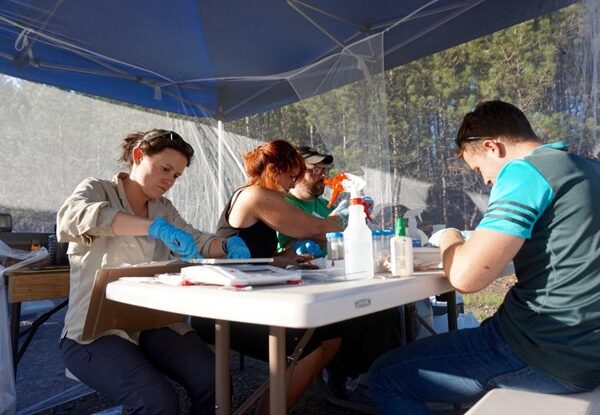
By Kelly House, Bridge Michigan, through the Institute for Nonprofit News network.
The Great Lakes News Collaborative includes Bridge Michigan; Circle of Blue; Great Lakes Now at Detroit Public Television; and Michigan Radio, Michigan’s NPR News Leader; who work together to bring audiences news and information about the impact of climate change, pollution, and aging infrastructure on the Great Lakes and drinking water. This independent journalism is supported by the Charles Stewart Mott Foundation. Find all the work HERE.
A wolf advocacy group is suing the Michigan Department of Natural Resources, arguing the agency is favoring hunting interests on a group tasked with helping shape Michigan wolf management strategy.
The 06 Legacy, a national group based in Michigan, alleges DNR Director Daniel Eichinger broke state law by appointing hunting advocates to positions on the Wolf Management Advisory Council that are reserved for agricultural and conservation interests.
The lawsuit, filed March 30 in Oakland County Circuit Court, comes as debate heats up over whether Michigan should allow wolf hunting after the Trump administration stripped gray wolves of federal Endangered Species Act protections last year.
The civil suit accuses Eichinger of attempting to “stack the deck in favor of wolf hunting” on a group that, by law, must include Eichinger or a designee, plus members representing conservation, hunting or fishing interests, tribal government, agriculture and animal advocacy.
Although the advisory council cannot make decisions about whether Michigan should have a wolf hunt — that task is reserved for the Michigan Natural Resources Commission — its advice could influence the commission’s eventual decision.
The E6 Legacy wants a judge to force Eichinger to appoint new members to the agriculture and conservation seats.
The current appointees, Michigan United Conservation Clubs Executive Director Amy Trotter and the Farm Bureau’s Richard Pershinske, are hunting advocates “masquerading” under the conservation and farming banners, said Karol Miller, president and founder of The 06 Legacy.
Trotter has advocated for a wolf hunt in Michigan, and Pershinske was quoted in a 2013 Detroit Free Press article as he prepared to participate in Michigan’s short-lived wolf hunting season that winter. Eichinger, the DNR director, is MUCC’s former director.
Trotter fired back in a press release, calling the lawsuit an attempt to “shift the narrative around what conservation is and the integral part hunters play in the conservation arena.”
MUCC spokesperson Nick Green argued that hunting supports numerous conservation efforts, as fees on licenses and taxes on guns and ammo help fund programs.
DNR spokesperson Ed Golder declined to comment.
Once wiped out in Michigan as a result of widespread hunting and government bounty programs, gray wolves have rebounded since returning to the state in 1988. As of last year, Michigan was home to at least 695 wolves, all of them in the Upper Peninsula.
The lawsuit follows disagreement about the composition of the advisory group, as both tribal leaders and U.P. hunting groups say they’re not adequately represented.
The wolf is sacred to Anishinaabek people, who see its fate as linked to their own, said Aaron Payment, chairperson of the Sault Ste. Marie Tribe of Chippewa Indians. All of Michigan’s federally-recognized tribes oppose wolf hunting, Payment said.
Payment said the DNR’s tribal appointee, Great Lakes Indian Fish and Wildlife Commission biologist Miles Falk, doesn’t satisfy the state’s mandate to represent tribal government interests on the council.
Falk, he said, resides in Wisconsin and is not employed by a Michigan tribe.
“It’s clear what’s happening,” Payment said. “They’re setting up the advisory council to move for a wolf hunt.”
Hunters say the opposite is true. In public comments before the Natural Resources Commission last month, Jordan Hoover of the Baraga County chapter of U.P. Whitetails, said he is “deeply disappointed and troubled” that the committee doesn’t include one of the peninsula’s hunting groups.
Hunting activists say there are too many wolves in the Upper Peninsula and their populations need to be controlled to avoid conflict with humans, livestock and pets.
They have backing from Upper Peninsula legislators including Sen. Ed McBroom, R-Vulcan, who authored a Senate resolution urging the Natural Resources Commission to authorize a hunt this year.
Wolf advocates note that conflicts between wolves and humans or livestock remain rare, and research has shown that wolves benefit the environment by, among other things, controlling deer populations.
“It’s not fair for Michigan citizens and it’s not fair for the wolves to have a council that’s stacked for pro-wolf hunting people,” said Miller, of The E6 legacy.
Members of the Michigan Natural Resources Commission, which sets state-managed hunting seasons, have indicated they plan to hold off on deciding whether Michigan should have a wolf hunt. It’s a view echoed by the DNR staff who say Michigan must first update the wolf management plan, consult with Native American tribes and wait out pending lawsuits over the federal delisting.
The advisory council was supposed to begin meeting this month, but no meeting dates have yet been set.
More on wolves from Great Lakes Now:
- Chippewa tribes blast wolf hunt, say it was about killing
- US states look to step up wolf kills, pushed by Republicans
- Wisconsin DNR board refuses to set early wolf hunt
- Pandemic interrupts longtime Isle Royale wolf, moose study
- Wisconsin says wolf season will be held next November
Featured Image: Debates about whether Michigan should allow wolf hunting are heating up after federal delisting last fall lifted a blanket ban on wolf hunting, leaving management up to states where wolves reside. (Courtesy of Michigan DNR)




